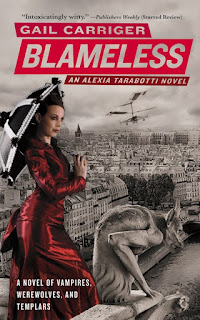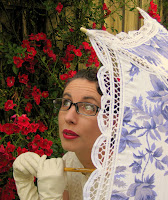Welcome to the fourth 3:2 Interview, where I ask an author three writing questions and two that are decidedly not about writing at all. Today I’m delighted to have a virtual tea with Gail Carriger. Gail is the bestselling author of the Parasol Protectorate series, an intriguing and vastly amusing mashup of urban fantasy tropes, steampunk fashion, and a Victorian comedy of manners.
Her main character, Alexia Tarabotti, is soulless—a condition that grants her certain powers in a London populated with werewolves, vampires, and other creatures of the gothic milieu.
Gail’s third book, Blameless, is available today at your favorite bookstore or online here.
KH: Gail, thanks so much for taking time out of your busy schedule to chat.
GC: Thank you for hosting me.
KH: I know that your books are primarily written to be entertaining—at which they succeed magnificently—but I also enjoy the subtexts of various culture wars. Alexia’s Italian heritage and her soulless condition mark her as “other” in Victorian London, and she becomes associated with quite a few “others” during the course of the series. Most often she fights back against intolerance with superior fashion and manners, and I appreciate the light handling of weighty topics and that the books do not ignore the prejudices of the era (and indirectly shine light on our own). To what extent are you consciously exploring these themes?
GC: I do tend to prefer to take as light a hand as possible with even the most weighty of matters. I enjoy frivolity in all its many forms. That said, I am aware of some of the subtext. I am consciously playing with (and spoofing) Victorian bigotry and stereotypes. Alexia has some modern sensibilities, but in the end, she is a creature of her era. As the series progresses, readers get to see how this has colored her worldview – sometimes unpleasantly. As to some of the other themes of tolerance and tea addiction, I do think that an author’s beliefs are bound to sneak into whatever she writes.
KH: Taking a break from questions of great import, I know you’re quite the tea aficionado. Right now I’m drinking Earl Grey with milk and honey, but due to being American—an incurable condition, I’m told—I’m desperately afraid that this makes me a rather pedestrian consumer. Could you educate my palate a wee bit? What sorts of teas should I seek out to mature my hopelessly American palate? And might this question be of greater import than I thought at first?
GC: Oh dear, this is quite a serious matter, indeed. I’m afraid I have never been one to condone the consumption of Earl Grey – nasty perfumey bit of business. I’m a Twinings English Breakfast gold label drinker myself. Which I have to track down and import from England specially. It’s better than the American Twinings because it can be brewed strong enough for a mouse to run across without getting bitter. It should be drunk with a healthy dollop of whole milk. The milk adds just the correct amount of sweetness. Good tea, like good espresso, should not need a sweetener. If it is so bitter it requires sugar it is either over-brewed, under-milked, or bad quality tea. Or the tea drinker his ruined his palate with something utterly plebeian like – shudder – soda.
KH: Clearly I have months of rehabilitation ahead of me. :) How much of a distraction do you find social media like Twitter, Facebook, blogs and so on? Are they gigantic timesucks that threaten your ability to write anything? How do you balance the need to promote and connect with fans with the need to meet deadlines?
GC: A terribly big distraction, but social media has been very good to me. I try to be self disciplined about it. When I have a draft due and a deadline, I spend about two hours on social media three days a week, and do things like schedule my tweets ahead of time, or hold off on blogging to save time. If I’m really doing badly at staying on target, I remove myself to a cafe that has no wifi. It’s difficult to balance because I want to be accessible and available to my fans, but I also need to write the next book or I won’t have any fans. Luckily, they are pretty understanding when I go dark. The hardest thing is the guilt, when someone takes the time to write to me I feel awful if I don’t write back immediately.
KH: Everybody wants to know more about bookshelf porn. (I can’t back that up, but I feel instinctively that it must be true.) You introduced me to the concept via your tweets, and I love it. Methinks the world would be better off if more people indulged. Which way do your tastes tend to run? The spare minimalism of modern shelves, the quirky shapes some of them employ, or the traditional wall unit of dark wood lurking in a study or library, faintly redolent of paper and glue and perhaps pipe tobacco?
Are you a purist who claims bookshelves are for books and naught else, or a knicknacker who believes bookshelves are enhanced by the addition of objets d’art, clocks, and maybe even action figures? What does your perfect bookshelf look like, and what might we see on it?
GC: It often surprises people but I’m a strict minimalist. I have a bit of an OCD side so I like my environment very tidy: modern or slightly Asian inspired furniture, nothing steampunk or frilly Victorian about it. To that end, I once saw a photo of someone who had organized all the books behind their couch by color. I live for that. As things currently stand, I have a mahogany bookshelf that came from my Scandinavian grandmother – very severe, on which reside all my favorite genre paperbacks and a small stack of trade sized Young Adult books. Then I have two stacks of Baedecker’s (Victorian period travel guides) and some of my more frequently referenced primary sources. I try not to buy anything in hardback. Sharing the shelf is one small framed picture, a bobble-headed gold plastic octopus, and a vase of fresh flowers. Hidden away in the wardrobe are my “messy looking” research books.
KH: Steampunk is going mainstream, if it isn’t already there. In addition there’s dieselpunk, atompunk, and a whole lot of other punks running around threatening to make people’s lives absolutely fabulous. Why do you think all these punks are suddenly so appealing in fiction? (And by “suddenly” I mean within the last decade.) Is it the next evolutionary step in fiction, an outlet for counterculture expression, a wistful longing for what might have been, or…?
GC: I have many theories on this. Part of the appeal, I think, has to do with our own sense of chaos and impending doom in America right now. This often causes people to seek out a time period that was more rigid and controlled, full of polite manners and forms of address. Steampunk has the advantage of being connected to an aesthetic that incorporates the maker movement and even the green movement. I think that is a large part of its charm: style, conscientiousness, beauty, and escape – all rolled into one.
KH: I can empathize with that immensely—the green bit especially. Gail, thanks so much for visiting with me! I can’t wait to read Blameless, and I wish you the best of luck with it!
GC: Thank you! And good luck with your own literary future.






